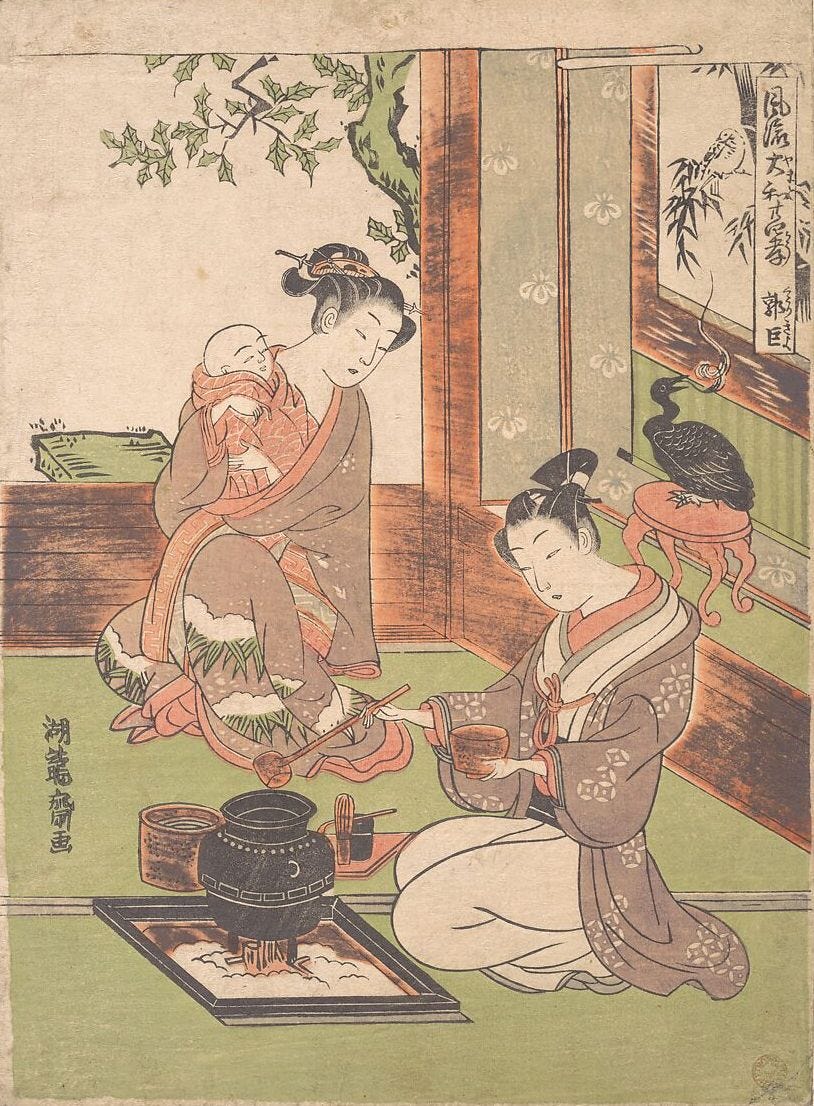Liu Mei shuffled to the front door, her slippers scooting across the wooden floor. She rose on tiptoes and leaned in close, one eye closed, to look through the peephole. The grocery delivery boy stood on her doorstep in his yellow shirt, staring at his phone. She stepped back and opened the door.
“Here’s your rice, auntie. Do you need me to put it in your kitchen?”
“Yes, that’s good,” she said, leading him to her galley kitchen.
He set the rice on the counter and turned to leave.
“Go slowly!” she called after him.
She heard the door close and leaned against the countertop. She closed her eyes for a moment, took a deep breath, and as if mustering up all her strength, she straightened, ready to proceed with the meal preparation. She pulled a knife from its block, set it on the bamboo cutting board, and selected some onions and garlic from the basket on the counter.
Strains from a Chinese violin soared from the square below and through her kitchen window. It was nearly dinner. Li Junjie played every afternoon at 4:00. His tune was melancholy this afternoon, and Mei felt the desperation in each slide of the bow on strings. She smashed the peeled garlic cloves with the flat side of the knife and minced the cloves. She quickly and expertly diced the onions with quick chops. Thin slices of pork were piled high on a platter, ready to be stirfried.
Mei turned to the bag of rice and pulled the string to open the bag. She dumped it into her rice container and then scooped two cups of rice into her rice cooker. She rinsed the rice under the tap and drained the water off, two, then three times. She added water until it covered the white grains. Returning the lid to its resting place atop the machine, she pushed the button down to begin the cooking.
Li Junjie’s song turned bright. The sun took the cue and peered around the edge of the wall cloud to the west. His bow skipped along the strings, staccato, hopping like a rabbit through the thicket. Mei’s heart lightened, and she checked the time. 4:15. Only forty-five more minutes. He would be here, and all would be well.
She filled the wok with vegetable oil. She turned on the fob and waited for the oil to shine. She added the garlic and stirred it until it turned brown, then skimmed it from the oil with a small wire strainer. Its sharp smell filled the kitchen, and her stomach growled. She cooked the sliced pork next until it browned. She removed it, added the onions and peppers she had sliced earlier in the afternoon when she was trying to pass the time. She soon returned the pork to the pan, added some soy sauce and some chili sauce. She looked at the clock. 4:30. She’d finished too early. She set the plate on the counter and covered it with a tea towel.
She shuffled to her room, thinking a rest might be in order. Li Junjie was no longer playing. He’d probably already gone home. All was quiet in the courtyard except for the cars passing outside the apartment complex. The children were all at their after-school lessons. It’d been so long since she’d had another person to worry about. Her side of the bed had a nightstand with a vase of flowers, a lamp, and a book. The other side of the bed was neatly made, but the nightstand was empty. The sight never failed to make her stomach ache. She lay on the bed and turned on her side to avoid looking at the emptiness of the other half of her bed. It had been six months of quiet. Six months of cooking for one. Six months of startling at every knock at the door. She sighed and wished Li Junjie were still playing.
Her eyes opened in panic, and she sat up on the edge of the mattress. What time was it? 4:59. She hadn’t missed him. She took a deep breath and let it out slowly and sliding her slippers back onto her feet, she stood. She shuffled again out of her room, into the dining room, past the bathroom, and to the living room where she would wait for him to knock. 5:01. 5:02. 5:03. He was often late. 5:04. 5:05. Where was he?
5:15. The door opened. The excitement rose, displacing the heaviness she’d felt in her stomach earlier, but she mustn’t let him know. There he stood, looking so like his father, that she gasped a little.
“My son, have you eaten?”
“No, Mother, I haven’t eaten.”
“Come in, come in. Have a rest.”
He walked in and closed the door behind him. She shuffled into the kitchen and tossed the plate of food back into the wok to reheat it for a minute.
“It smells good. I miss your food. I’m so hungry.”
“Sit down. You can eat, and you can tell me about university.”
He sat in the chair at the table, picked up his chopsticks, and filled the bowl of rice with the stirfry. He took a bite and closed his eyes, enjoying the meal. She smiled and joined him.
Modern Versions of the Twenty-four Paragons of Filial Piety: Guo Zhu, Isoda Koryūsai, c. 1770.




This is such a sweet story, Amanda! The emotions of it are clear and strong, and
I enjoyed your description of the meal prep, down to smashing the garlic clove and rice prep—that’s how I prep mine!
Wow. That was so good! Now I'm wondering what happened to the Father. She does seem so lonely. It makes me feel sad.